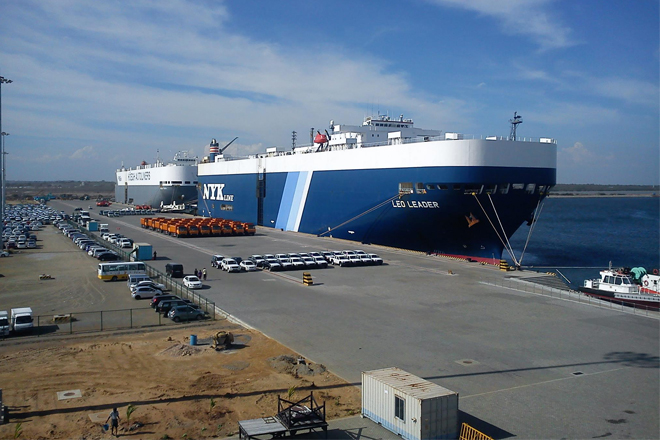online pharmacy buy desyrel no prescription pharmacy
A free port is an area of a port in which imported goods can be held or processed free of customs duties before being re-exported. Free Port legislation Hanif Yusoof, President of Expolanka Holdings said the Free Port legislation indeed allowed a blanket approval. “My experience is that when we started this hub with the new act, it created lot of curiosity and interest,” he said. “When the hub regulations came in I did invest the 6 million dollars as required by the framework of investment,” “But if you ask me weather you really knew what you were investing. No I did not know.” Yusoof replied. “Today we have an over capacity at Colombo port. Capacity is 6 or 7 million TEUs (Twenty-foot Equivalent Unit) but only have 5 million businesses.” Indeed the Finance Act - Commercial Hub Regulation No. 1 of 2013 brought significant benefits and exemptions to logistic providers operating in free ports or in bonded areas. Under the regulation, Katunayake Export Processing Zone and Koggala Export Processing Zone were declared as Bonded Areas. Mattala Rajapaksa International Airport and Mirijjawila Export Processing Zone also declared as specified Bonded Areas. Diren Hallock, Chairman of DRH Logistics, however said Sri Lanka needs to convert the whole country in to a free port to effectively emerge as a logistics hub. “If you look at Singapore or Dubai, they emerged as logistics hub based on the whole country being a free port,” Hallock said.
buy stromectol online buy stromectol online no prescription
“In India, a freight forwarder can invest 100 percent without any restriction. But we in Sri Lanka continue to have restrictions.
online pharmacy buy propecia no prescription pharmacy
” According to him these legislations have done little improvement to sector development. “Can Sri Lanka effectively emerged as a hub when there is a piece of legislation that essentially takes what was happening in this country and makes it easier to be done if you put in X million dollars,” “The fact is entrepot trade and transshipment was happening in this country; MCC is happening in this country; and it was happening even without a Hub Act.” Hallock stressed. Archaic Laws Romesh David of John Keells Holdings said the country is very myopic in its outlook. “Until 2009 we had the water blame, until 2013 we had the lack of a hub act to blame, but the reality of it is that we don’t have any serious players who are willing to invest in this country,” David portrayed outdated laws as one barrier for foreigners to investing. “If you want someone to invest here you can’t have archaic laws or processes about ownership and take two days to do a transshipment rework,” David stressed. “You can’t have ream of documents which you have to fill. When the KPI in Dubai is that cargo has to be from a ship onto an airplane in 6 hours, and where customs don’t even want to know what’s in that cargo until after that cargo has gone.” Romesh David said changing the legislation is not going to open the door, but we should not have laws as barriers as ultimately cargo, like water, will take the path of least resistance. “More impediments we have to that in the form of legislation, rules and regulations, bureaucratic processors, lack of automation are going to kill that.
online pharmacy buy nolvadex no prescription pharmacy
” David said. Way Forward Hallock sees value added transshipment and logistics as a one aspect to turn Sri Lanka into a hub. “We are already doing the transshipment with 3.5 million TEUs now,” he said. “In this 3.5 million TEUs that come to the country, container in and out, can we at least tap a certain percentage of that and value add to those containers,” Yusoof called the operators to try countries in the Indian sub continent as a destination since the middle income class is growing there. “We are surrounded fortunately by counties which are consuming today. 30 years ago that was not so, they were manufacturing countries.”
“Today, India is becoming a sourcing country. So when we say free port facility what does it mean? It’s about the intermediate trade because industries are fragmented now.” he said.


port of colombo all major warehousing entire tea export business and container storing taking place in an area where higest traffic congestion and most densley populated area thereby cost and time wasted with more custom documentation and congestion in the port. why not have a hinterland port with a dedicated road to comnect port of colombo and hinterland port. I have done some research on this. if any body interested can contact me on fernando.srilal@yahoo.com